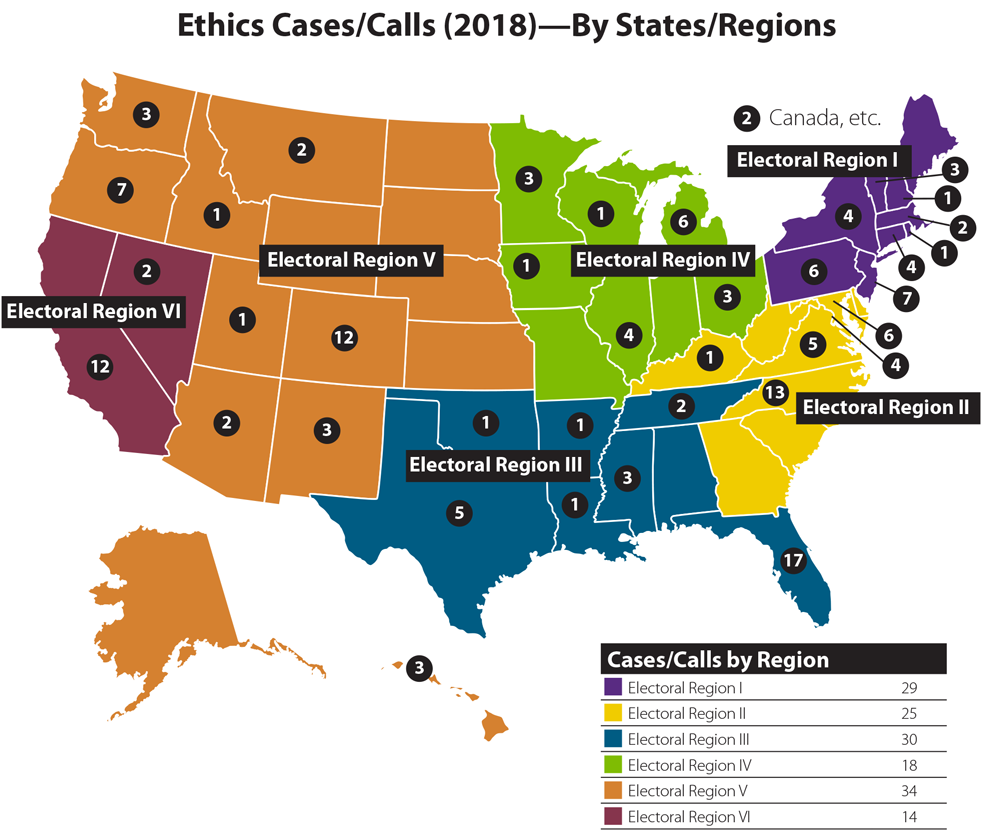Planning Ethics: Lessons from 2018

Each year, the AICP Ethics Committee posts an annual report on planning ethics, per the requirements of the AICP's Code of Ethics and Professional Conduct (section C5b).
The ethics-related activities for 2018 included: 15 misconduct cases, 135 informal inquiries, and other actions taken by the AICP's Ethics Officer and the seven-member Ethics Committee.
The Annual Ethics Report also tracks the most common ethical topics raised by planners — as well as members of the public — in informal inquiries and formal complaints of misconduct.
For instance, in 2018, nearly one-third of the inquiries and misconduct cases involved issues of "Honest and Fair Dealing" (i.e., Ethics Code Rules of Conduct #11, #17, #18, #19, and #20), One-quarter of the inquiries and complaints referenced "Conflicts of Interests" (Rules #3, #5, and #6), while another one-quarter mentioned "False, Deceptive, or Unsubstantiated Statements" (Rules #10, #11, #12, and #18).

Ethics Report Shows Profession's Integrity
What other things can be learned from last year's planning ethics-related activities?
- Nearly half of last year's ethics cases (7 of 15) concerned the misuse of the AICP credential by planners who no longer actively maintained their certification. In each instance, the planner agreed — in writing — to cease using the credential, following a warning letter from the Ethics Officer.
- Of the eight "misconduct" complaints received, seven were dismissed following an investigation by the Ethics Officer. The eighth is still under investigation.
- Thirteen of last year's 15 ethics cases were the results of inquiries/complaints by planners or APA chapters/sections; the other two were made by members of the public.
- One hundred and thirty-five (135) informal inquiries were received — and answered — by AICP's Ethics Officer. Nearly half of the inquiries (63) came from planners employed in the public or nonprofit sectors, while more than one-third (37) came from planners employed in the private sector. The rest of the inquiries came from members of the public (16), APA chapters/sections/staff (8), elected/appointed officials (6), and academicians (5).
- Over the past four years (2015–18), 369 informal inquiries have been made to AICP's Ethics Officer. During that period there have been 59 ethics cases (misconduct or misuse of the AICP credential) and three requests for formal advisory opinions.
- Based on those inquiries, cases, and requests, the Ethics Code's Rules of Conduct have been cited 700 different times. The most frequently cited Rules — at an average of 18 times/year each — were #7 (confidential information) and #1 (accurate information). Following that were: #25 (wrongful act) at 14 times/year and, at 12 times/year, #3 (changed positions) and #14 (special advantage).
- A new "ethics training rubric" was prepared by the Ethics Committee for use in teaching ethics at planning schools. This rubric has been shared with planning programs through the Planning Accreditation Board and with the APA chapter and section Professional Development Officers.

If you have an ethics issue, please contact the AICP Ethics Officer. All communications will be confidential. For instance:
- If you would like to seek informal advice on an ethics matter, please leave a voicemail message for the Ethics Officer at 312-786-6360.
- If you would like to file a misconduct complaint against an AICP member, please complete an ethical misconduct form at www.planning.org/ethics.
- If you would like to report someone you believe is misrepresenting themself as an AICP member, please send an email to ethics@planning.org.
Top image: Thinkstock photo.


